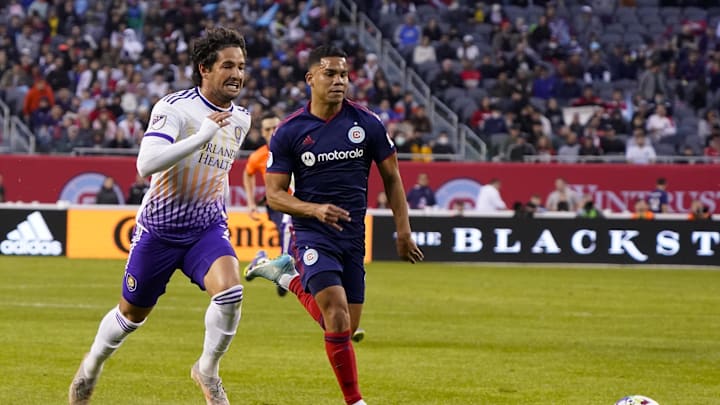Orlando City shot the ball 23 times in its last two games against FC Cincinnati and the Chicago Fire. With all of those attempts, Orlando scored just once and have only 1.57 expected goals, per FotMob. The eye test confirms this lack of quality opportunities as well.
There were a handful of genuinely quality chances against Cincinnati in the first half, but more often than not, Orlando's offense devolved into low quality crosses from the fullbacks that were either way off the mark or easily dealt with by the Cincinnati backline.
If that level of stagnant offense is bad, the performance in Chicago was an atrocity. Orlando had 0.09 xG from open play, and completed 13% of their crosses. Do you remember anything that Orlando did in the final third of that game other than the disallowed goal, which came out of nothing and against the run of play?
This lack of offensive production and creativity is not a newfound phenomenon for Orlando City. Much of the Oscar Pareja era has been hard to watch in the final third. Outside of a handful of games, including the entire MLS is Back tournament, Orlando's been a defensive, pragmatic team that really only scores goals when one of its stars does something amazing.
I thought that problem was changing after the season opener against CF Montreal. Orlando used the ball to create space and created very intentional goals. The first goal of the season was a very intentional and repeatable chance. That type of fluid, intentional offensive football has largely vanished in the weeks since.
When Orlando tries to create and combine in the final third, it's often derailed by an errant pass or a poor touch. It's no one player either. The entire frontline struggled to string together multiple passes in tight spaces.
More than the execution, the ideas themselves aren't creative enough to break down a compact defense, even one as porous as Cincinnati. Too often, Orlando gets the ball wide and plays it to a fullback who will either whip in an early cross from deep. That's fine to do every now and then, but it looked as if those early crosses from fullbacks were the primary offensive strategy.
When your offense features Facundo Torres, Mauricio Pereyra and Alexandre Pato, I don't know why you'd want fullbacks playing as the primary chance creators. The system was just too predictable.
To Orlando's credit, there were genuinely good chances in the first half. The chipped cross from Pato into Ercan Kara is a goal more often than not and was a good passage of play. But moments like those are few and far between.
It's too early to panic about Orlando's attack, but the early signs are worrying. Torres and Kara are still integrating into the team, and Argentine wonder kid Gaston Gonzalez doesn't arrive till May. Once those guys fully gel with the other pieces, things should improve, especially in combination play. And even when those players get up to full speed, it's on Pareja and the system to be more varied, because quality chances do not come this way. For Orlando to realize its full potential, things have to look a lot more like they did against Montreal than Chicago. The group is talented enough to pull it off, but whether they can do it for a whole season remains to be seen.
